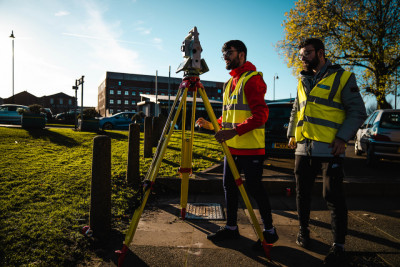
University of Bolton, Deane Road, Bolton. BL3 5AB
Tel:
Email:


“At the University of Bolton, we take great pride in providing a quality, supportive learning environment for our students.”
Professor George E Holmes DL | President & Vice Chancellor
“...tutors are very supportive and you’re not just a student ID number, at this university you are an individual with a name.”
Ellisse Vernon | BSc (Hons) Adult Nursing
Back to menu
Back to menu
Study with an Off-Campus Partner
Back to menu
Back to menu
University of Bolton, why we are the right choice
Location - Bolton, Greater Manchester

02/03/2022
While it’s possible to get a job with an undergraduate degree in civil engineering, a master’s is the best way of gaining a competitive edge and enjoying career progression.
 If you’re a third-year student thinking about what to do next, a master’s degree should be front of mind. The University of Bolton’s MSc Civil Engineering course has been designed to take your skills to the next level, preparing you for a successful career.
If you’re a third-year student thinking about what to do next, a master’s degree should be front of mind. The University of Bolton’s MSc Civil Engineering course has been designed to take your skills to the next level, preparing you for a successful career.
Here are the reasons why every civil engineering student should consider staying on at university and earning a postgraduate qualification…
Demonstrate advanced skills and knowledge
A master's degree in civil engineering is a great way of showing potential employers that you are highly skilled. It also demonstrates your dedication, and a passion for continued learning and development, a trait that is essential for people in this profession.
When it comes to recruitment, employers look favourably on those with second degrees as it highlights a greater level of commitment, making civil engineering postgraduate training a worthwhile investment.
Find your specialist area of interest
Another reason third-year students should stay on and do a master’s is the opportunity to take more control of their career path, shaping it in the direction that inspires them. At Bolton, we work closely with students to establish their career goals and ambitions and tailor the course to align with their personal and professional development needs, as well as market demand.
This means you can hone your skills in the areas that interest you the most, with the support and guidance of our passionate teaching staff.
 Build on traits that employers are looking for
Build on traits that employers are looking for
Mathematical and scientific knowledge are essential for careers in engineering. But employers now look beyond technical skills when hiring new talent, especially for managerial roles, or any roles that are designed for continued training and development.
Civil engineers are required to have a multitude of skills for the workplace. These include effective problem solving, good judgement and decision-making, critical thinking, research skills, ability to analyse complex sets of data, creativity, commercial awareness, and excellent risk management.
Furthermore, managers must possess the right soft skills in order to succeed in their endeavours. Communication skills are essential for presenting concepts and designs to the board, and engineers need to be able to collaborate well in teams.
Our MSc Civil Engineering course is as much about self-improvement and personal development as it is about broadening your technical knowledge. We deliver interactive and engaging modules that allow students to practice both independent as well as team working. We also use our industry connections to present live projects and secure placements, giving you hands-on practical experience of what it’s like to work collaboratively with others.
On top of that, we help students gain the utmost commercial awareness, so they know how to manage and communicate with stakeholders within the business.
Prepare for roles in leadership
A bachelor’s degree is usually the absolute minimum requirement for jobs in civil engineering. First-degree holders can apply for entry-level jobs, but as it’s a highly competitive field you may be up against candidates who are more qualified than you.
For most managerial positions, a master's degree in civil engineering is a mandatory prerequisite. Some roles may even demand a doctorate, and our MSc Civil Engineering is the ideal platform for going into further education.
Earn an advanced qualification for life
Although a master's degree in civil engineering allows you to specialise, it’s still diverse in terms of transferable skills. A civil engineering degree opens doors to various careers as well as further study.
Some of the alternative career paths include aerospace, environmental consultancy, geology, logistics, operations, patent law and intellectual property, quantity surveying, research and development, supply chain management, teaching, technical sales or consultancy, and more.
Grow your professional network
Our course will guide you as you explore the complex roles and responsibilities of civil engineers in relation to social, natural and built environments, assessing how economic constraints can influence project management and decision making. Our goal is to prepare you for career progression into leadership.
We also do this by helping you expand your network. Because who you know matters as much as what you know. Civil engineering postgraduate training is the perfect opportunity to establish links within the industry and forge meaningful connections with peers, faculty, and industry professionals.
Are you interested in staying on at Bolton to study for a master's degree in civil engineering? As a leading Greater Manchester university that’s passionate about delivering UniAsItShouldBe, there’s nowhere better to continue your journey of growth and development.
To find out more about applying in 2022/23, see our MSc Civil Engineering course page for details.